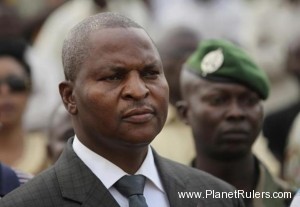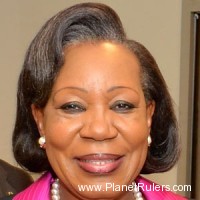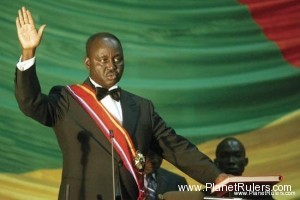Faustin Archange Touadera, President of the Central African Republic (Elected on Feb 14, 2016)
 Faustin-Archange Touadéra (born 21 April 1957) is a Central African politician and academic who served as Prime Minister of the Central African Republic from January 2008 to January 2013. According to the announcement of the national electoral authority made on February 19, 2016, he was elected President of the Central African Republic in the second-round run-off against former Prime Minister Anicet Georges Dologuelé. He takes office in April 2016.
Faustin-Archange Touadéra (born 21 April 1957) is a Central African politician and academic who served as Prime Minister of the Central African Republic from January 2008 to January 2013. According to the announcement of the national electoral authority made on February 19, 2016, he was elected President of the Central African Republic in the second-round run-off against former Prime Minister Anicet Georges Dologuelé. He takes office in April 2016.
Touadéra was born in Bangui; his family was originally from Damara, to the north of Bangui. He received his secondary education at the Barthelemy Boganda College in Bangui before attending the University of Bangui and the University of Abidjan. He earned a mathematics doctorat in 1986, supervised by Daniel Gourdin at the Lille University of Science and Technology (Lille I) in France and another doctorat, also in mathematics, which was supervised by Marcel Dossa at the University of Yaoundé I in Cameroon in 2004. In 1987 he became assistant lecturer of mathematics at the University of Bangui and was vice-dean of the University’s Faculty of Science from 1989 to 1992. In the latter year he became director of the teachers’ training college. He joined the Inter-State Committee for the Standardisation of Mathematics Programs in the French-speaking countries and the Indian Ocean (CIEHPM) in 1999, serving as the President of the Committee from 2001 to 2003. He became Vice-Chancellor of the University of Bangui in May 2004. Touadéra subsequently served a rector of the university between 2005 and 2008, during which time he launched several key initiatives, such as the entrepreneurship training program and the creation of the Euclid Consortium.
Source: https://en.wikipedia.org
Catherine Samba-Panza, Interim President of the Central African Republic (Since Jan 23, 2014)
 Catherine Samba-Panza (born 26 June 1954) is the interim president of the Central African Republic and the first woman to hold the post. Prior to becoming Head of state, she was appointed Mayor of Bangui from May 2013.
Catherine Samba-Panza (born 26 June 1954) is the interim president of the Central African Republic and the first woman to hold the post. Prior to becoming Head of state, she was appointed Mayor of Bangui from May 2013.
Samba-Panza was born in Fort Lamy, French Equatorial Africa, to a mother from the Central African Republic (CAR) and a Cameroonian father. Prior to politics, she was a businesswoman and corporate lawyer. She moved to the CAR at the age of 18. She was trained in law at Panthéon-Assas University.
Source: https://en.wikipedia.org/wiki/Catherine_Samba-Panza
François Bozizé Yangouvonda, Former President of the Central African Republic
François Bozizé Yangouvonda (born October 14, 1946) is the President of the Central African Republic. He came to power in March 2003 after leading a rebellion against President Ange-Félix Patassé and ushered in a transitional period of government. He won the country’s 2005 presidential election; he received the most votes in the first round in March 2005, but less than a majority, requiring a second round, which he won in May 2005.
Early life and Kolingba’s rule
Bozizé was born in Gabon, a member of Gbaya people, and attended a military officers’ training college in the Central African province of Bouar, becoming a captain in 1975. He was appointed brigadier-general by Emperor Jean-Bédel Bokassa in 1978. After Bokassa was ousted by David Dacko in 1979, Bozizé was appointed defense minister. During the military rule of André Kolingba (1981–1993), Bozizé was appointed communications minister, but was subsequently accused of plotting a coup attempt. After being arrested in Cotonou, Benin in July 1989, Bozizé was imprisoned and tortured, but he was acquitted in December 1991.
Kolingba held elections in 1993 and Bozizé became a presidential candidate. He took only 1.5% of the vote; Patassé was elected president in a run-off against Abel Goumba.
Supporting Patassé
For many years Bozizé was considered a supporter of Patassé and helped him suppress army mutinies in 1996 and 1997. Bozizé was then named the Armed Forces Chief of Staff.
Bozizé showed no activity against Patassé and frequently crushed revolts against the president.
Against Patassé
On May 28 2001, a coup was attempted against Patassé and defeated with the help of Libyan troops and Congolese rebels of the Movement for the Liberation of Congo. Afterwards, Bozizé’s loyalty was questioned, and in late October 2001 he was dismissed as army chief of staff. Fighting erupted when the government tried to arrest Bozizé on November 3; after five days of this, government forces aided by Libyan troops captured the barracks where Bozizé was based, and Bozizé fled north to Chad.
Fighting between government forces and Bozizé’s rebels continued during 2002. From October 25 to October 31, his forces unsuccessfully attacked on the capital, Bangui; the Congolese MLC, who again came to Patassé’s aid, were accused of looting and rape.
This period was marked by tensions between Chad and Patassé’s government. Patassé’s ruling party accused Chadian president Idriss Déby of destabilizing the Central African Republic by supporting Bozizé with men and equipment.
The final coup, transition period, and election as president
On March 15, 2003, Bozizé finally succeeded in seizing power, with his forces entering Bangui unopposed. Patassé was returning from a meeting in Niger at the time, but could not land because Bozizé’s forces controlled the airport. Patassé took refuge in Cameroon and then Togo.
Bozizé appointed Abel Goumba as Prime Minister soon after seizing power in March, later making him vice-president in December and appointing Célestin Gaombalet in his place as prime minister. Bozizé also suspended the country’s 1995 constitution after seizing power, and a new constitution, reportedly similar to the old one, was approved by voters in a referendum on December 5, 2004. After seizing power, Bozizé initially said he would not run in a planned future presidential election, but after the successful constitutional referendum, he announced his intention to stand as a candidate on December 11:
After thinking thoroughly, and being deeply convinced and keeping in mind the nation’s interest, I grasped the deep sense of my people’s calls. As a citizen, I’ll take my responsibility.
I’ll contest the election to achieve the task of rebuilding the country, which is dear to me and according to your wish.
On December 30, 2004, Bozizé was one of five candidates approved to run in the presidential election scheduled for early 2005. On January 4, 2005, Bozizé announced that three initially excluded candidates would also be allowed to run, although former president Patassé was not included in either group. In late January, it was announced that more candidates would be permitted to run in the election, bringing the total to 11 and leaving only Patassé barred. The elections were also delayed by one month from the previously scheduled date of February 13 to March 13.
Bozizé came in first in the March 13 election, taking just under 43% of the vote according to official results. He faced Patassé’s last prime minister, Martin Ziguélé, in a second round of voting; this was held on May 8 and according to official results announced on May 24, he won with 64.6% of the vote. He was sworn in on June 11.
The parliament authorized Bozizé to rule by decree for three months, from January 1 to March 31 2006; his prime minister, Élie Doté, said that this period of rule by decree was successful, enabling Bozizé to take measures to streamline the civil service.
In addition to being president, Bozizé has been defense minister since taking power. After the end of the transitional period, he remained in this post when Doté named a new cabinet in June 2005, and also kept it following a September 2006 cabinet reshuffle.


